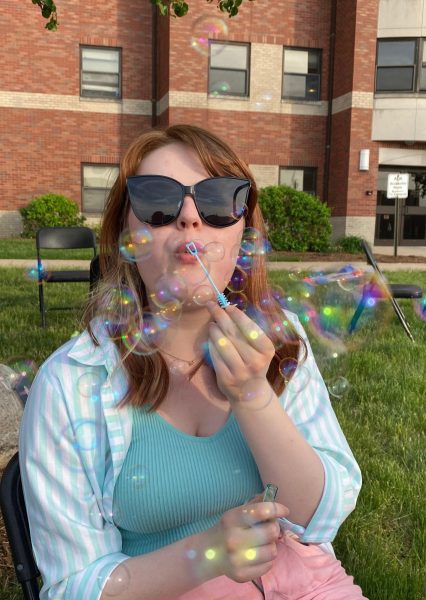Two Lives Intertwined: Prange’s Professional and Personal Balance
Raphaella Prange hates missing work, but she recently took a few days off to vacation in Malibu. While there, she went to the beach, ate breakfast with Goofy—and walked her youngest sister down the aisle.
On the morning of the wedding, Prange followed the professional photographer, discreetly snapping pictures on her phone as the women in the wedding party got ready. A photo of the bridesmaids in matching robes. A picture of Prange’s daughter with her aunt. And a black-and-white shot of the young bride, adjusting her veil.
That day, Prange was the acting photographer, the oldest sister of five girls and two half-siblings, and the parental figure for her youngest sister. She gave her sister away during the ceremony and then toasted the marriage in the mother-of-the-bride speech at the reception.
“Raphaella is the matriarch of our family,” Isabella Palmer-Tejeda, the bride and Prange’s youngest sister of the five girls, said. “She’s the leader. The connector. The skills that she brings to the table in her professional life, she is able to translate well into being the glue that holds all of us girls together!”
Prange has been the glue for most of her life. She used to take care of her four younger sisters, nicknamed “The Ellas” because their names all end with the suffix, while her parents worked. Even in childhood, she became the one who everybody else looked up to and learned from.
“I think from early on, I was always the navigator, the executor, the person who completed the tasks on behalf of a lot of other people, so it’s kind of a natural set of skills that I brought to the table and obviously continue to use,” Prange said.
When they were young, her sisters watched Prange take care of them and excel in school. Now, she regularly fields their questions about career decisions and 401ks.
Similar questions often arise in her interactions with students. At Millikin, Prange is the Vice President and Dean of Students, and she serves as a Title IX Coordinator. She is focused on how she can help students cultivate the lives that they want to lead, and she has clawed her way up to one of the highest positions at Millikin, not caring who she upsets in the process.
“She’s this human that I look to and I’m like, ‘That is someone I hope to be, someone who’s respected, someone who can be a good friend and colleague,’” Bailey Hope, a senior who has worked closely with Prange, said.
Prange obviously has a huge role at Millikin. But at the end of the day, she goes home and focuses on her more important role as mother, wife, and sister.
That, then, is the duality of Prange—or, as some alumni and coworkers affectionately call her, Ralph. In her activity at Millikin, throughout the community, and at home, she’s an intelligent, compassionate problem-solver. But there’s more to her than just her drive in her professional life, and the difference between Professional Prange and the woman she is off-campus is not so clear-cut. She brings some of what she’s learned in her life to work with her, and vice versa.
Take, for example, Prange’s drive. This determination has pushed her to the high level of professional success that she’s currently at. But her hunger for this success, and her devotion to creating it, originated in her home life when she was a child.
“With my dad being an immigrant to this country, having a fifth-grade education, and my mom not completing college, and being in a community where we had a lot less than the folks living around us, I think the motivation for me was getting out,” Prange said. “Not so much that it was this horrible experience in this negative environment but being able to take advantage of what was in front of me so that I could make a better life for myself than what I knew my parents had had.”
Her parents, both artists, expected Prange to challenge herself and work hard. But these expectations felt more like encouragement than pressure, and Prange rose to meet them.
After graduating high school at 16, she toured colleges across the country, finally settling on DePauw University because of its journalism program. Prange moved from Florida to Indiana with big dreams of becoming the next Diane Sawyer.
“I wanted my own life,” Prange said. “I was like, ‘Yes, that’s so far away! I can be far away from my family and pursue my dreams.’”
But this pursuit turned out to be more difficult than she expected. The next four years were a whirlwind of studying, working, and trying to make ends meet. At one point, she was working four jobs between classes.
When Prange contracted mono and was subsequently fired from her first on-campus job, she had to call home and ask for help. She has always had high expectations for herself, and this failure was a huge blow. Painfully aware that she was asking her family to go without, she decided to work twice as hard to succeed and make her parents proud.
“I knew how much my family was sacrificing having me away from all my younger siblings, because I did childcare my whole life for them,” Prange said. “Without me home, I think that provided kind of a gap for my family that they had to close, and financially, it was a huge stretch…My parents did without a lot of things so that I could go to school. So, I knew what was at stake and what was on the line if I failed. I took that really seriously.”
After her sophomore year of college, a trip to Nicaragua solidified Prange’s determination to succeed. Her father grew up in Nicaragua, and he packed suitcases of clothing and medicine to bring to family members who remained there. Prange was 18, and she still remembers the horror she felt at the poverty she saw. She returned from the trip with a new understanding of what her parents had sacrificed and what she needed to do in return.
“My father always told us that education is your key to the future,” Prange said. “It’s what unlocks everything for you…I think he wanted to show us why we should try, what he faced as a child…We came back, and I was like, ‘Okay, I need to be even more serious than I was before we went.’”
This seriousness paid off. Prange has experienced immense professional success after starting at Millikin when she was 22. Twenty years later, she now holds one of the highest positions at the university.
But what has made her successful—her drive—can also push people away. Prange is aware of how some people view her, and she knows that her decisions are not always well-received.
But even so, she rarely backs down. And most of the time, her choices prove to be right.
“It almost always comes around. And she’s even said to me, ‘See? I told you I know what I’m doing,’” Kelly Finn, the executive assistant in the offices of Campus Life and Student Affairs, said. “I think that a strong woman in a leadership role can sometimes be seen as something that might be slightly uncomfortable. She probably ruffles feathers sometimes, but what I can tell you is, whatever she’s working on, she has the student and she has the university’s interest in the foremost thought in her brain.”
While some people might dislike Prange’s choices, others find her honesty and self-assurance to be refreshing. They compliment her focus on solving problems, not just dealing with them, and they respect her goal to help people as much as she can.
“She doesn’t really like the bandaids. She likes the surgery that can fix the problem,” Trevor May, an alum who is close with Prange, said. “It’s actually a really fun time to work with her because it’s meaningful. What you’re doing, it might be sticky, but it can be impactful.”
Prange is conscious of her role as a leader. She works to conceptualize and implement programs and projects that benefit other people, even if her ideas are unliked at first. Some might find that overwhelming, but those who are close to Prange think it is impressive.
“I think that she ultimately exudes confidence,” Jennifer Toney, a Millikin alumna who worked closely with Prange, said. “Which, I mean, if that intimidates you, I guess that’s on you. Right away, you know her expectations are high of herself and others. And again, if you’re feeling insecure about that, she’s not lowering her expectations or lowering her standard. You have to rise to meet her.”
Although Prange is confident in her role as a leader, the constant scrutiny—a lot of which is gendered—can be a bit much at times. Out of this idea came the “ladies’ club,” which has expanded to include several female leaders in Decatur. In 2016, Prange and two colleagues formed the group as an antithesis to the gentlemen’s club that so many male professionals enjoy. One of their first projects involved creating vision boards for their career trajectories, and Prange remembers how motivating that experience was.
“We all joked that we would keep [the vision board] under our desks where only we could see it…but I think I took it home because I wanted to show my daughter,” Prange said. “That’s always a little bit of a challenge to find ways to make sure that my family feels valued, but then I’m also, in a way, showing my daughter that you don’t have to follow a traditional path, that you can also have your own identity and pursue your passions and also have a family.”
Three years after its formation, the group still meets monthly to vent, talk about their jobs and community initiatives, and discuss their professional goals. (For Prange, these goals include starting a doctorate in the next five years.)
These women continue to be great resources in her professional life as well as friends who understand the pressures of balancing marriage, motherhood, and a career.
Finding this balance is one of Prange’s biggest concerns. At a lot of other universities, people in Prange’s position are unmarried, or, if they do have families, they don’t live with them.
But for Prange, family has always been important. She is devoted to her job, but the people in her personal life take precedence. Additionally, some of the most effective strategies in her job can be taxing to carry with her constantly, and she doesn’t want all her time and energy to be swept up in her work.
Because of this, she is conscious of separating her professional and personal lives. Her duality is intentional. She tries to find outlets beyond work to create a full life for herself and her family.
Her husband of 16 years helps her with that. Prange describes Rob as Type B, her complete opposite. When Prange gets home after a long day in her office, she either busies herself in the garden or immediately changes into her pajamas. Then, the two decompress together, watching TV (her favorite show is “Scandal”) or just talking about their days. They’ve created a home in the middle of Decatur with a garden, pets, and chickens in the backyard.
“He’s brought me to all that, and I really appreciate that, because I can imagine if I didn’t have all those things in my life right now I’d be a pretty miserable person,” Prange said. “You can’t just be this one-dimensional crazy driven person. There has to be some outlets, and I think that he’s created that soft landing for me. When I get home, I have that from him.”
Prange and Rob try to take one trip together every year, just the two of them. Both of them prioritize experiences, and they enjoy outings and family time.
In her free time, Prange loves to cook without recipes, using produce from their garden to experiment with the dishes that her father used to make. She shares these experiences with her two kids, Robert and Suzanne. Prange regularly logs hours at Robert’s baseball games and Suzanne’s dance recitals.
It’s important to Prange to be involved in her kids’ lives and model hard work, but she also wants them to recognize the importance of having outlets and spending time with the people they love. Prange enjoys her job, but her self-worth isn’t dependent on it—another lesson she learned from her parents, and one that she’s trying to impress on both her kids and her sisters.
“Raphaella showcases how her drive and care for those around her only makes her stronger,” Palmer-Tejeda said. “She’s someone that everyone can learn from.”
Prange is constantly thinking about how she can improve, what she can do for the community, and how she can keep moving forward in her career. But in the vineyards of Malibu, as she toasted her little sister’s marriage and danced with Rob, she relaxed for the night. Her kids were happy. She had just married off the baby of the family. Her work—meeting with students, organizing lecturers on campus, discussing education initiatives in the community with colleagues—could wait until Monday.
There is a photo of Prange with her siblings and their father that she has hanging on her office wall. The girls are laughing with their arms around each other, and all seven siblings are crowded around their father. When she sits at her desk, she can see the people who have made her who she is.
There is definitely a duality to Prange.
But maybe the best parts of her are intertwined.










